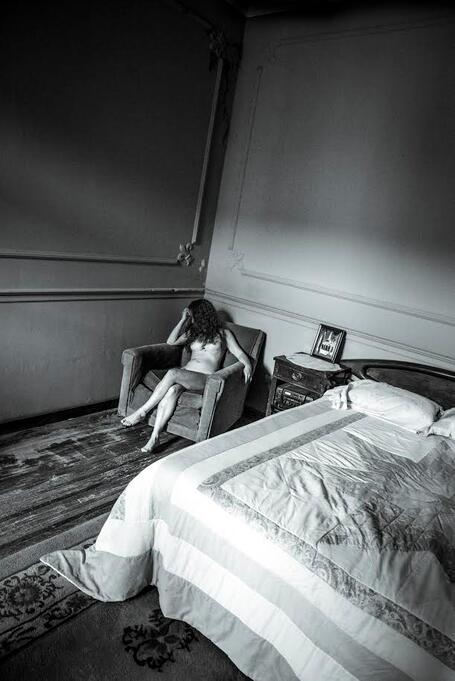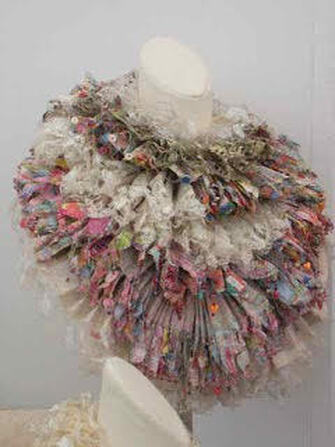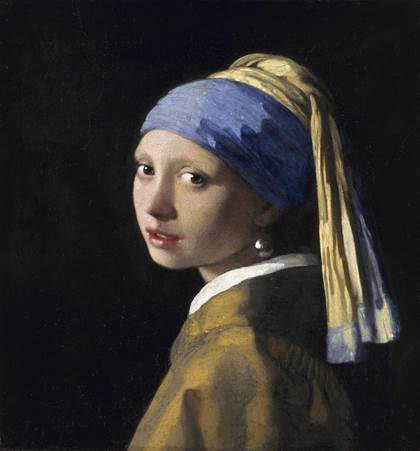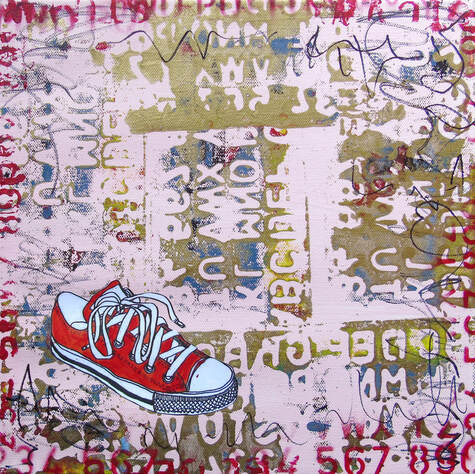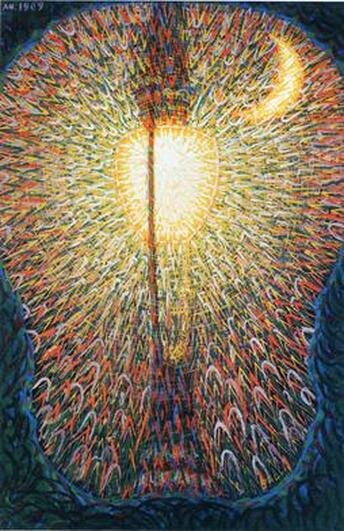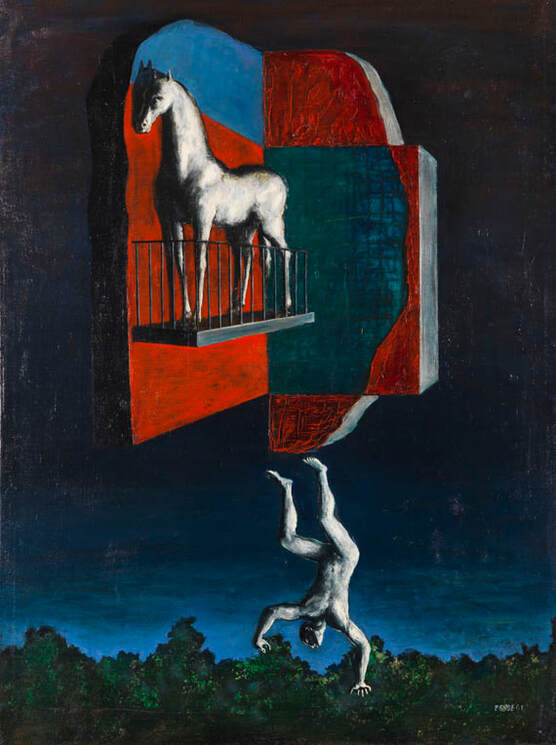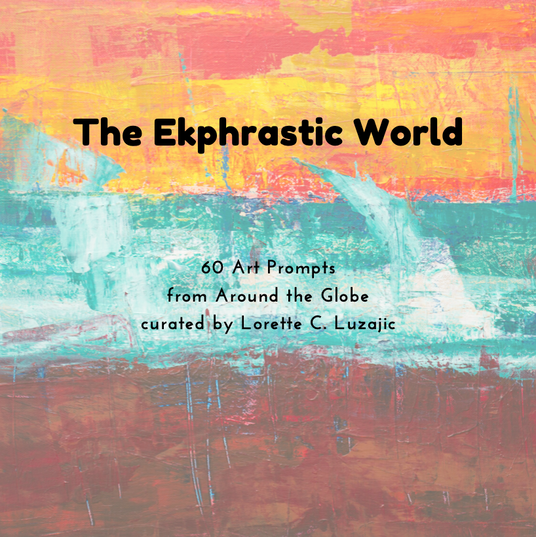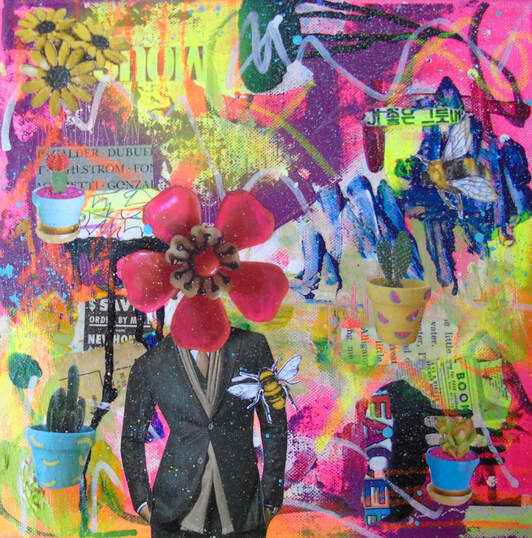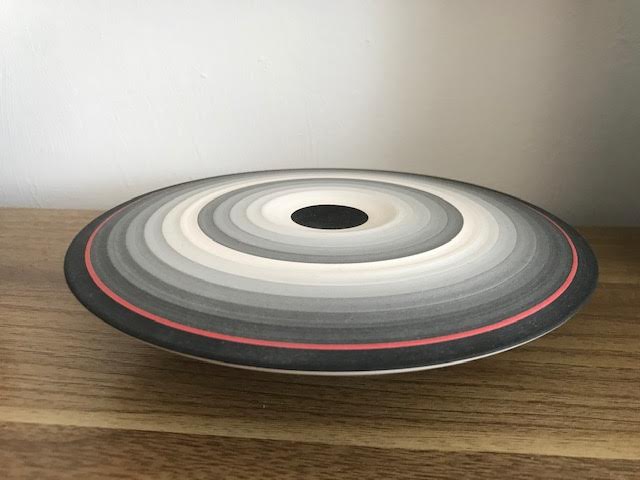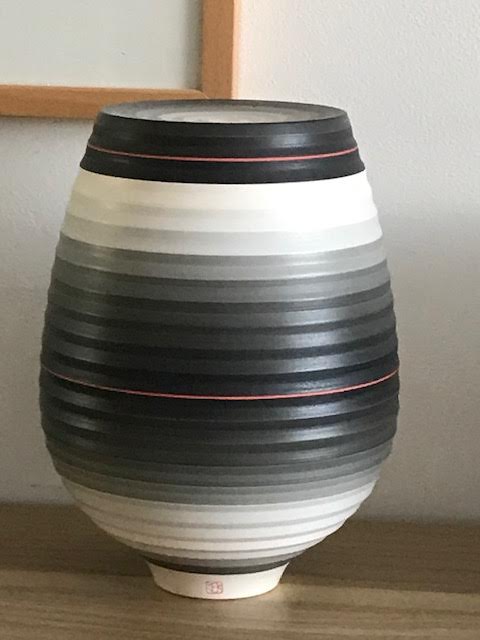|
Nude in Chair Take 1 In the left corner of a too big bedroom, she sits, head in hand, belly soft, thighs dimpled against worn velvet armchair, dusty blue. Bed in foreground, un- mussed patchwork quilt, mismatch to the pearl buttons of her sweater she keeps in her lap, pearls she keeps buttoning, unbuttoning, buttoning. My demented aunt did the same. But this woman appears to be in her forties. Pencil skirt and gold lame blouse folded just so on the dresser. Fingers worrying her brow. Beside the chair, a too bright bulb as if an interrogation room.. See how the light from the lamp slits her body in two? Take 2 You drape the sateen sheet halfway over her thigh, adjust the folds perhaps to sharpen the shadows between the folds. Or shed light on her flesh-curves. Every color—you will turn—to black and white. Magenta sheet, olive skin, dark angle of the bend in her knee—I am jealous of the nude who sits head in hand in the velvet chair. Her whole body posed by your hands. You snap the pearls—worry beads between her fingers—shoot the winter blue eyes. The nude—a still life of your grief. Take 3 I try on pavé diamond rings at Diane Glynn’s, though you haven’t proposed. The jeweler ,who has only one real breast now, wears a 3-carot-clear- yellow rock, scarlet-red lipstick and bride-white wig. A bent and muttering man wanders the shop. She shakes her head, rolls her eyes. Go sit down. She tells him. He does. Rises, paces. Six years now. She tells me. No words except “Son of a bitch” and “Go to hell!” She laughs when she says these things. Once over dinner at a noisy restaurant you asked if I wanted to be surprised or if I wanted to decide together. We are seventy, in quarantine, and uncertain- ty runs rings around us all. Yet even before COVID, I’ve been measuring the circumference of my ring finger. The distance between marriage and promises of forever we keep making and remaking. Take 4 You ask me not to laugh at you for focusing on the light. I think of Poppa how he taught me fabric and beauty—taught me silk boucle for curtains heavy floral brocade for formal chairs taught me scallop valance is made by folding fabric in overlapping curved tiers, draping the tiers above curtains thereby adding grace and beauty, but not how the layers block the light at the top of the window from coming through. Taught me grief and love, but not where to look-- for light. Forgive my not seeing the light in the folds of each day unfolding. Sometimes I cannot recall I am living— a lucky life—and you are always an innocent man. Have I told you you look like Poppa? Once again, I think of Poppa how his lucky life came too late to save his family from unlucky fates. How he was an innocent man sentenced to survival’s incessant stabbing shadows. Forgive my seeing his shadow in the folds of my own face I thought was yours. Doris Ferleger Doris Ferleger, Ph.D., award winning poet and author of Big Silences in a Year of Rain, As the Moon Has Breath, Leavened, and When You Become Snow, has been published in numerous journals including Cimarron Review, L.A. Review, Poet Lore, Rattle, and South Carolina Review. The 2009 Poet Laureate of Montgomery County, PA., Ferleger holds an MFA in Poetry and a Ph.D. in psychology and maintains a mindfulness based therapy practice in PA. Daniel Goldberg took this photograph in San Miguel de Allende in Mexico, at a workshop with Keith Carter during the annual celebration of the town's patron saint Michael. This photo was shown at the Phillips' Mill show, where he has been twice awarded Best Body of Work. Other photographs have won awards at the Perkins Center for the Arts, Grounds for Sculpture, and the Mercer County Annual Show with a photo accepted into the permanent collection of Mercer County. Goldberg's work was also included in the first and third volumes of Seeing in Sixes (2016 & 2018), a juried publication of LensWork. He is a member of Gallery14 a photography gallery in Hopewell, NJ. He is also licensed psychologist/psychoanalyst/couples therapist with a private practice in Princeton, NJ.
0 Comments
Soak It and See We choose the materials, collected from our lives, added, shaped, imagined. We look to stitch our future together, making a garden sewing seeds, nurturing flowers. We search for harmony with a mixture of elements colours, forms, thoughts. We see each piece as needed to prevent emptiness at the heart of the whole. All are essential, at first, then overwhelmed by life which overflows, to become a torrent washing away the unneeded, flooding our hopes, washing away what the water chooses, not always what we want it to be. We are swept down many channels, sometimes pleasure, sometimes disappointment. But we continue to load the material, stitch it together with a purpose, and, again, soak it, and see. Bert Molsom Bert Molsom retired early to become an apprentice poet, fully understanding apprenticeships last a long time! He has been long-listed for the Bridport Prize, won Poetry on Loan 2016 and his work has been published by Anthropocene, Ink, Sweat and Tears, Acumen and The Ekphrastic Review. Jill Flower creates designs by stitching strips of paper cut from magazines to a soluble backing which she then soaks for various periods to see what results. Each ‘age’ (childhood, maturity, old age) is interpreted by the use of pages from magazines that depict the influences, developments and interests as we mature. To Franz Kline (1910-1962, American abstract expressionist) From Pennsylvania coal fields you learned early, life often belts us with black and white passions, like lessons, stark and harsh. You thought large, in huge calligraphy, painting horizontal fists of pigment like trusses and spiked bump stocks. Your art howls, wants to brawl, be noticed, like you…unwanted, orphaned. Your wife posed for you in a rocking chair, like Whistler’s mother, before madness laid its claim. This melding of positive and negative - blank canvas crosshatched with thick black swaths. Frank O’Hara called that action. There, also, though, an element, vulnerable, human, caged/protected, by a firm carapace. Jeanette Willert Jeanette Willert, former Associate Professor of English Education at Canisius College in Buffalo, NY and Director of the Western New York Writing Project, served as Vice-President of the Alabama State Poetry Society. She was honoured as their 2018 Poet of the Year. Her chapbook Appalachia, Amour won the Morris Chapbook Award (2017), Her poems appeared recently in Goat’s Milk, WINK and Libretto and, Crosswinds Poetry journals and the 2020 Anthology of Appalachian Writer (Vol. 12). Her first poetry book, it was never Eden, will be published later this year. Pearl Earring On an evening stroll along Amsterdam’s canals, he finds himself in de Wallen, the center of the city’s prostitution, well known for many centuries before. He finds her behind a window outlined in red. She is about twenty with a demeanor of expectation, an attractive girl with piercing looks for sizing up the potential wealth of men passing by. She always uses the time-worn rule: the better dressed the wandering man, the more he will be willing to pay. On entering an inviting unlocked door, he finds himself in an oft-used bed chamber, a sheet- covered bed in a far corner, wash basin with toilet at another. The approaching young woman asks how many guilders he will be willing to pay. He responds up to five, a lot in those days. A deal has been made. As she retires behind a curtain to remove her clothing, he states that he is not lusting for sexual adventure. He tells her that he is an artist, a skilled portrait painter. Reaching into the case that he carries, he removes a small jacket trimmed with gold braid, a blue headband, a white turban with scarf to hang from the back of her head, red ointment for her lips, and last of all, a pearl earring to grace her left ear. He asks her to turn her head to the left and then to affect an inviting gaze and faint smile. Charles H. Halsted I am a retired academic physician. My poetry education consists of twelve online courses provided by Stanford Continuing Studies and various poetry workshops in California, Oregon, and New Mexico. Currently, I have published more than eighty poems in thirty three poetry journals, in one chapbook, Breaking Eighty, and in one full book, Extenuating Circumstances. A second full book, On Razor-Thin Tires, is in press for publication in December. Potentially of interest, I am the grandson of Charles Hopkinson, who was a noted landscape artist and portrait painter of the last century. Vamoose Demon, Demon Begone! I can’t spell, so I wore a leotard to the exorcism. I can’t sing, so I screamed like a cello in love. I can’t get over you, so I tattooed your heart, brick by throbbing brick, on the wall along the ditch into which I hurled your next-to-last red shoe. Now you jitterbug among rushes and rusting shopping carts, spiders’ silken filaments, tadpoles writhing their slippery cursive like noodles in alphabet gumbo. You goggle frogspawn, fondle postdiluvian bric-a-brac and lost lottery tickets, hawk unclaimed futures while phantasms play hide and seek in moldering fedoras and ankle bracelets, mood rings and mismatched sneakers, shivering an ectoplasmic shimmy and singing find me somebody to love. They wind themselves around your ankles like a kitten or a fog, slither up your inseam, run fingers along your dendrites like piano keys on fire. They tickle your clattering ivories, diddle what you thought had died. Gossamer doodads and glowing motes cavort among the sunbeams. The insect orchestra tune their instruments while I limber-up in the wings. They say it takes two to tangle. Are you reeaaaady to rhuumbaaa?!?! Because who hasn’t slam-danced with a specter, who hasn’t made love to a ghost? Who hasn’t hitched themselves to a monster, lashed themselves to a pomegranate and screamed for juice? Who hasn’t cha-chaed off the deep end in one cherry-red Chuck, laces undone, tongue tied-up in elaborate knots? Brent Terry This duo is part of a larger collaboration between writer Brent Terry and artist Lorette C. Luzajic. Lorette is creating several collage-paintings to respond to Brent's poems, and Brent is creating poetry to respond to Lorette's artworks. Lorette C. Luzajic is an award-winning artist whose collage paintings have been collected in over 25 countries. She is also the author of Pretty Time Machine: ekphrastic prose poems, and editor of The Ekphrastic Review. Visit her at www.mixedupmedia.ca. Streetlights stoning burden of fog upon lost hours laden sea & sky if only languished gods above & beyond were lamplighters descending terra firma ascending babel ladders lighting silenced stars Terrence Sykes Terrence Sykes was born and raised in the rural coal mining area of Virginia. This isolation brings the theme of remembrance to his creations, whether real or imagined. Other interests include cooking, gardening, heirloom vegetable research & foraging wild edibles. His poetry - photography - flash fiction has been published in Bangladesh ,Canada, Ireland , India, Mauritius, Pakistan, Scotland, Spain and the USA. Upon Seeing Nude in the Box, 1962 "Light is my inspiration, my paint and brush. It is as vital as the model herself.” ~ Ruth Bernhard, photographer To be certain, there are those days, the ones too filled with doings, when I feel laid to rest, boxed like Bernhard’s nude, reclining, restricted, not able to stretch myself beyond the edges obligations draw. Why move when movement only finds constraint? Why try to stand when horizontal planes arrest an impulse to arise. There is the slightest yearning in this nude, her arm extended just beyond her head, grasping space beyond the box, hoping for beyond. For me, when I can glimpse the corners of my life beyond my captive self, I’m inclined to toss, to turn, to rotate to the perpendicular, to let my arms and legs propel me to beyond, to unencumbered light that paints away the darkness of this life, at times too busy to see beyond. Barbara Simmons Barbara Simmons grew up in Boston, now resides in San Jose, California –the two coasts inform her poetry. A graduate of Wellesley, she received an MA in The Writing Seminars from Johns Hopkins. As a secondary school English teacher, she loved working with students who inspired her to think about the many ways we communicate. Retired, she savors smaller parts of life and language, exploring words as ways to remember, envision, celebrate, mourn, always trying to understand more about human-ity. Publications have included, among others, The Quince, Santa Clara Review, Hartskill Review, Boston Accent, NewVerse News, Soul-Lit, 300 Days of Sun, Writing it Real, Capsule Stories: Isolation Edition, & OASIS. Ende's Busephalus Responsa In the footsteps of Alexander the Great I too rode my Bucephalus Two millenia later Along the Santorini shoreline at Eros Beach Rearing up like a bronzed statue To equine antiquity Astride a well-trained Andalusian steed The perfect war horse for cavalry mounts Whose ancestors carried conquering Macedonians From Thrace to Persia Heroic exploits exceeding even Mythic Perseus and Pegasus As I cantered alongside limestone cliffs Awash in the timeless spray foam of the Aegean Sea Bruce Jacobs Bruce Jacobs is a retired educator and administrator with the Toronto District School Board. He is currently a keyboard player with the motown/funk band One King. ** It's All About the Horse Do you see him, standing so still on that narrow balcony? His moonlit silver coat gleams contrasting with the dull red brick of my ordinary house, both skyborne, both in my dreams. I know that man who tumbles earthward now He surprised me on the balcony, tried to steal my steed, but no, my dream horse threw him off. Only I can ride him Astride, together, we will cross the sky, over trees, away from the ordinary. We will leap across the lake of tears Leaving behind the man, leaving all who seek to hurt me with words, with deeds. I feel no pain when I ride. Even looking at him lifts me I see his supple muscles ripple as he breathes, his power, waiting for me. When we ride, I have power too. Yes, it’s all about the horse. Joan Leotta Joan Leotta loves to play with words on page and stage. Her poetry has appeared in The Ekphrastic Review, Verse Visual, Verse Virtual, among others. Her short stories, articles, and essays are also widely published. On stage she performs tales of food, family, and strong women. When not haunting art galleries for inspiration, she wanders the beach, cooks, and spends hours talking and laughing with family and friends. Her chapbook, Languid Lusciousness with Lemon is out from Finishing Line Press. ** Fall from the Horse of War, 1961 Edgar Ende, forced to stop painting by Germany in 1936, conscripted as a gunner, has a man, naked, fall from Alexander’s horse corralled in a balcony on the Berlin Wall. Surrealist dreams wait through nights for the first cup of coffee when chairs are set out at the cafe while your bed sweats twenty years of artillery blasts. A year after the building of the wall, we worry the Cuban Missile Crisis 90 miles from the coast of Florida and the haunt of Hemingway. A warrior loses his stage and the dialog between two men and a beautiful woman in For Whom the Bell Tolls centres around how many horses needed to get out alive. We hide under desks not far from the coast, only obtain a white horse if we chase it across a field and ride three on its back, still young enough we’re not a burden. A rifle brings down what motors by the book depository in a convertible, wakings now riddled with metal shards before we board the bus for school. Kyle Laws Kyle Laws is based out of Steel City Art Works in Pueblo, CO where she directs Line/Circle: Women Poets in Performance. Her collections include Ride the Pink Horse (Stubborn Mule Press, 2019), Faces of Fishing Creek (Middle Creek Publishing, 2018), This Town: Poems of Correspondence with Jared Smith (Liquid Light Press, 2017), So Bright to Blind (Five Oaks Press, 2015), and Wildwood (Lummox Press, 2014). With eight nominations for a Pushcart Prize, her poems and essays have appeared in magazines and anthologies in the U.S., U.K., Canada, and Germany. She is the editor and publisher of Casa de Cinco Hermanas Press. ** The Beginning of the Ende held in illusion-- a bottomless web The horse has a shadow, but it casts from no apparent light source. No path appears between staying and going. Reversed, his vision seems frozen. What he sees—is it profound or just strange? No time to brood about meaningless questions when all life has fallen away. He considers wings, creature wings, human wings, and they open in his mind with a stunned shattering, a magnetic pull of man to horse, a merging of elements rising towards the consuming fire of creation. form-- a process replenished by time Kerfe Roig A resident of New York City, Kerfe Roig enjoys transforming words and images into something new. Follow her explorations on her blogs, https://methodtwomadness.wordpress.com/ (which she does with her friend Nina), and https://kblog.blog/, and see more of her work on her website http://kerferoig.com/ ** Shadow So rare as window, psyche drawn - they speak of mesmerising frame - internal shadow laid afore, from fearful eye, flit cloak withdrawn, turn sunlight beaming, morning star, so stallion tamed, but not the mind. The surreal, Surreal classed, Spiegel im Spiegel, mirror work, not art prefabricated, stored; haunch to wall, blue eyed from foal, the two, both Great and Head of Ox association, myth in mix. Kafka, Baron, Father Brown, the mare of night, tall story, bike, this name has long been borrowed, worn by fiction, mystery, old lore, then told, one generation more, by Michael, other Ende on. This artist told he cannot paint, express himself, what’s in his brain; as war destroyed his oeuvre past, is this the mighty hemmed, cross barred, or Plato’s cave, where shades are played? Like funnel flag of shipping line or white, black field, as terror sign - identity - so twinkle’s where? What exploits, epic tales hear groan, who brims in head, unstable, door, unbolted view, dark horse alleged, free fall of man - how Kafkaesque - Bucephalus, rein unrestrained? Stephen Kingsnorth Stephen Kingsnorth (Cambridge M.A., English & Religious Studies), retired to Wales from ministry in the Methodist Church, has had over 160 pieces published by on-line poetry sites, including The Ekphrastic Review, printed journals and anthologies. https://poetrykingsnorth.wordpress.com/ ** To Edgar Ende Regarding The New Bucephalus The French, their films, reborn untamed historic place in art had claimed -- the human tale more coarsely told as if transmuting base to gold from veins of raw emotion mined for pyrite of ironic find to play upon illusive stage as mirrored lustre to engage the mind in wisdom twice retold becoming lesson taking hold much like your fabled horse as toy that represents the pain and joy untamed becoming lured descent beyond the roar of discontent. Portly Bard Portly Bard: Old man. Ekphrastic fan. Prefers to craft with sole intent of verse becoming complement... ...and by such homage being lent... ideally also compliment. ** O Captain O Captain’s child bestride atomic Bucephalus broken and slouched your lance unready tilting at viral windmills riding ever downwards proclaiming “the world is flat” the fearful storm return’d and your compass has been lost so you ride boldly ride your course is already set down the ramp of history to face a false foe and how we fell far short of any victory deserved Mark A. Fisher Mark A. Fisher is a writer, poet, and playwright living in Tehachapi, CA. His poetry has appeared in: riverbabble, Spectrum, Silver Blade, Penumbra, Lummox, and many other places. His first chapbook, drifter, is available from Amazon. His second, hour of lead, won the 2017 San Gabriel Valley Poetry Chapbook Contest. ** Masterpiece No stars. Tonight, an air-raid sky, streaking Prussian ink. Somewhere out of woods, imagined flares light my free- fall into blues. You could stop me if you whinnied, reared up, kicked iron, braying some alarm to spirit me back. But you stand erect, unmoved by sound or shadow, so calm within a peacetime cage. You wait there, bronzed, as I spiral, naked as at birth. You let me plunge headfirst, hands out to darkness. No parachute is opening to cloak the crash onto rust-flecked wire barbs below where starved crows or buzzards twist and pull my artist's guts until there’s just some pecked carcass. And I am nothing, except what’s left in you. Dorothy Burrows Based in the United Kingdom, Dorothy Burrows enjoys writing flash fiction, short plays and poetry. This year her poems have been published on various webzines including Words for the Wild, Another North, The Ekphrastic Review and Failed Haiku. ** A Dream In the dream he tries to mount an untamable horse, tumbles again and again, like Sisyphus doomed to endless, timeless struggle, through the turning of days, years, empires ascend and wane, shimmer briefly--like stars--to fall into a black hole, where upside down becomes right side up. Even so, the dream is immutable, caught on canvas-- as the world revolves again under the glimmering echoes of light that was, galloping toward what might be a chimera, a challenge, or a vision. Merril D. Smith Merril D. Smith is a poet and historian. Her poetry and stories have appeared recently in Rhythm & Bones, Vita Brevis, Streetlight Press, Ghost City, Twist in Time, Mojave Heart Review, Wellington Street Review, Blackbough Poetry, and Nightingale and Sparrow. ** High Horse Victory secured By an embellished crown blazing And grandiose breastplate Underlined with tunic blue Regalia passed down to the eldest With divine right to rule He relishes in bardic rhythm The singing clash of swords Composing a kingly epic Riding higher than the common man All must look up in exaltation This touch of heaven Will lift him to legend Pride squarely measured In blood stained pawns Corpses evidence his power Nothing can cage this vision Until pain blemishes royal blue Failing equilibrium shifts prophecy As he reaches out for the earth Life conquered in coursing red Still the final thought Of his spinning mind proves true “A king does not die” Widows will tell stories of the king’s hubris Remembered for generations Forever the fallen angel Naked in his ambition Amanda Chandler Amanda Chandler’s muse kindles her passion for poetry and education. She believes the most important lessons in life can rarely be found in a textbook. This is why she shares her experience and distinct perspective through poetry (even when it makes her feel vulnerable) hoping others may dare to do the same. ** Literally That’s always going to be you, that man falling. For just half a moment, forget that ’94 ever happened, forget that there was no way out of that one. For now, behave as if there were half a hundred ways that whole thing could have played out that would have ended well. Believe they all would have ended well for you and for them. Yes, that’s still you falling, but why is it now? Is it because of the first one, or maybe because of your mother? Is it the latest one, and just because she doesn’t want you? Are you still falling regardless of which of any of these women choose anyone other than you? Are you so far gone that you yourself are gone? The crown has been uncrowned, the seat usurped, and here you are left with nothing but the truth—all of it. This is what you said you were always willing to live in full admission of…yet here you are damning at and hating it, wanting to go back farther and farther until…what?—until that isn’t you falling to your death? Stop re-writing where he’s going! He’s dying, he’s not being delivered from a grim fate, he’s not being reborn, he’s not saved by the horse that’d once been his only friend. It’s questionable whether that “friend” is even looking on anymore, or if he’s got his sights set on another he’d like to befriend. The point is: you’re still falling. You’re going, going, going—gone! And this time you’ve no say in how this plays out. You have all the time in the world to consider and reconsider everything and everyone at every possible moment you were alive and you dreamed and were slain by them. But you are on your way to death and you still see your end as coming from without—from them!—instead of from within: you! You took it too much to heart, all of it. None of them were “the one” and none of them wanted to be. Even those who thought it over, who might’ve even said yes, even they would have changed their minds about you. A curse is not a collection of poor choices—that would be your life. And now, your death is only the admission that these were your choices that never felt like choices in the moment. It’s not ’94, fine…it’s all of them, every one of them. But not any of these women in and of themselves—it’s what you did and what you said in convincing yourself you were nothing without them. The old man said they would be your downfall, and of course, why not take him literally this time. The only other time he was right was when he said you were your own worst enemy. Of course, of course. Garth Ferrante Garth Ferrante is a complete unknown who writes and makes games out of challenging his own creativity. He writes because he loves to, because he finds meaning and purpose in it, because if he didn’t, life would be lifeless. ** The New Bucephalus Floating above, Ghostly white, Statuesque, The New Bucephalus stands. No color in him now, No life, Gone is Philoneicus’s wildhorse, The once shadow-shy and mighty Favored mount of Alexander, See how he is thrown, The king of Macedon is thrown, Ever-earthward into the canopy, The New Bucephalus stands In a suspended UFO stall, A balcony-penned alien Unscared of its shadow. Ian Evans Ian Evans is an emerging writer and middle school teacher with his B.A. in English and an Ed.M. in Secondary English Education. He is co-author of "The Mechanic," a graphic poem. He lives in Highland Park, New Jersey, with his wife, who is also a writer and teacher. ** Freedom A naked man and his naked horse run away from his house one midnight. The horse can sprout invisible wings, and fly. They flew high above the ground, far away from the man’s house, away from the man's wife and son, and all responsibilities. He wanted to be free. Free like his naked horse which flies. The naked horse wanted to be free of the naked man. Searching for escape, they find a floating palace mid-air, a golden palace. The naked man and the naked horse walk inside to find the rooms painted in blocks of colours. Light blue, indigo, blood red, orange. The naked horse absorbed its wings back. They went out the balcony to look at the sight outside. Dawn was approaching. Hedges and trees and shrubs and hills turned from black to dark green. The green of the earth and the blue of the sky were now separating from the one whole black they were earlier. From the balcony, they saw a huge mass of smoke rising. The sun rose to see dense dirty brown smoke coiling like thousands of pythons mating in mud, going up higher, and higher... Suddenly sparks appeared within the coil. The naked animals saw orange, deep orange fire-like thing created inside the fury of the mating dance. Then suddenly, a huge boom… ! BOOM. The world was white for a moment, everything miles around it destroyed, even the palace the naked animals were at. Only a bit of the palace was left floating. The the balcony could fit only one animal now. The naked horse kicked the naked man off. The horse should have flown, the man should have been on the balcony. But the horse kept standing on the piece of concrete afloat. The naked man fell head on, downwards, (gravity doing its work,) thinking of his wife and his son, and the ultimate freedom which all animals find in the end, whether they want it, or not. The naked man’s wife and son died in the blast the naked creatures witnessed, the wife unaware of her husband’s running away, the son not knowing of his father’s abandonment. They died loving him. The naked man swam to his life having landed on water, and not concrete. It was Ammonium Nitrate, they said, - that caused the ruin. Not nature’s fury, nor an alien attack, but faulty storage of an otherwise harmless chemical, which used properly would have fertilized the soil making it more productive, benefiting the land. The opposite happened. Carelessness caused the fiasco. Carelessness, which was felt upto 150 miles. Carelessness, and 5000 people hurt. Carelessness, and 135 lives lost. And more. What price to pay for carelessness! So much loss for nothing! The naked man all clothed now, is bound by the human chain again, searching for another wife, wishing for another son. The winged horse flew away to freedom. Susma Sharma Gurumayum Susma Sharma Gurumayum is from India. After receiving a Gold Medal in her Masters in History, she went on to do a PhD in Environmental History. She has won four poetry competitions organised by Kaafiya, a poetry community based in Delhi, India. She loves words. ** The Release of Wild Things And when Bucephalos was tamed, he dreamed of the steppes. Of breathless runs, of sand, stone, mountains and wide, flowing rivers. When he could still fly, his mane whipping his back in a wind blown by the gods. They said he had wings. And after the man had gained his trust, the man cut those wings. Bucephalos’ sorrow filled the air he breathed; his cries pierced Andromeda. The man who’d cheated him of his freedom swung upon his back and reminded Bucephalos of his loss. When the man’s heels pressed into his flanks, Bucephalos bucked against the humiliation. Then he resigned himself. There was nothing else. Bucephalos communed with the gods of horses, after all he had been a prince in his own right. Before. He would have been a king. And the gods guided him through battles, pain, and indignities. Never dishonour. Never that. He would serve his master as though of his own free will and thus transform his subjugation into an act of pride and sacrifice. One day the gods were busy elsewhere. Bucephalus sustained grave injuries. Dying, Bucephalos relaxed into his homecoming, and saw himself rising towards the night sky proud and erect in a small cage made for men, a cage of contradiction that he knew would set him free. His last breath was a thrust of powerful thought, and the man who had been his nemesis and only friend tumbled into space, naked and powerless in the knowledge that he would never again aspire to a kingdom. Rose Mary Boehm A German-born UK national, Rose Mary Boehm lives and works in Lima, Peru. Author of two novels and Tangents, a full-length poetry collection published in the UK in 2011, she was three times winner of the Goodreads monthly competition. Recent poetry collections: From the Ruhr to Somewhere Near Dresden 1939-1949: A Child’s Journey and Peru Blues or Lady Gaga Won’t Be Back. Her latest full-length poetry MS, The Rain Girl, will be published by Chaffinch Press end August 2020. ** Ox Head They said he was untameable and afraid of his own shadow, branded skittish with an ox head, none could soothe his rodeo. The gentling of Bucephalus began with the gentle whispers and flourished into fraternity without saddle, reins or spurs. They camped under starless skies, future king and Thessalian steed, faced the sting of metal and watched men bleed. Too many men and horses died in battle to the song of war cries and weapons’ rattle. Kim M. Russell Kim M. Russell has been writing poetry since she was a schoolgirl but only began submitting to competitions and anthologies when she retired from teaching in 2014. Her poems have been published on-line by Visual Verse, among others, and in print: Afflatus Magazine, River Writes (Bure Navigation Conservation Trust), Anthology of Aunts and Second Place Rosette (Emma Press), Peeking Cat Anthologies 2017 and 2018, and Field Work (UEA Publishing Project with Kunsthalle Cromer). She lives in the UK, in East Anglia between the North Sea coast and the Norfolk Broads, with her husband and two cats. ** Mighty Bucephalus Onstage Majestic Bucephalus, but the rider, fallen. First suspended from nothing but a memory. Below, a range of trees waits to receive. Was it your horse, Great Discoverer, who made you great? Was it because you knew how to lead? Did you whisper in the ear? Did you know how to turn the head? This horse would have no shadows-- by the Jhelum he lay down. How great the love between horse and rider. Carole Mertz Carole Mertz, poet and essayist, is published recently at The League of Canadian Poets, The Bangalore Review, and in Poetry Quarterly (print edition.) She enjoys reviewing for various literary journals. Her forthcoming collection Color and Line is with Kelsay Books. ** The Moon-Shadow Horses "Where there is much light, the shadow is great." Goethe "The uses of shadow are simply modern perversions of a symbol people see in themselves which represent fear of the world, of political change." Phantammeron, Mitchell Stokely i. Was the blue night deep and starless over the valleys of Thessalonika when the moon-shadow horses emerged from Aegean sea waves? Near Larissa, they pulled the chariots of the gods for centuries, from Greece when Alexander spoke soothingly to an untamed horse, great in history, whispering of their future, how Bucephalus, his forehead marked with a fallen star, meant freedom and desire, the fulfillment of the boy's dreams, traveling east from Macedonia; and it could be said the horse's trust was created by the boy's breath, instinctive -- the fire of friendship and determination -- how Alexander trained Bucephalus so he wouldn't see his shadow -- a darker horse which seemed to distress the animal. ii. and there's no way to test the velocity as wings glued with wax begin to melt, liquid flowing through feathers -- owl, eagle, hawk, and crow -- birds sacred to Zeus and Apollo, the gods turning away as Icarus flies too high, escaping Crete, solar power not yet the center of scientific cosmology, the impact of its heat inaccurately measured by the unevolved truth of laws defined by terra firma -- the greenhouse effect (warm or too warm?) -- as the boy fails to navigate the heavenly flames and falls, his body reversed, upside down so he can see Poseidon's horses rising from the sea, and the horses of Hades pulling a chariot; and above, a white horse with wings, Pegasus too late to save him from the gates of gravity. iii. There is no record of a crash in the "Aerial Times," if the moon-shadow horses pulled a chariot that collided with reality in a constellation, stars in the shape of Pegasus seen by Ptolemy at Alexander's camp fires; or a fire-blast from the sun's chariot, broken in half before dawn. In his studio with a sky-light, the artist paints a New Bucephalus, unable to move on the canvas, caged by a balcony that resembles the front of a chariot -- the Sun's or Moon's -- his body shining like polished metal, the 13 Talents Alexander wagered to win him. "The cart has come before the horse," and Bucephalus is looking down, trying not to see his shadow, pinned to him when the moon is blocked by the corner of a wall broken away in Berlin. iv. The artist's choices were not his own after bombs falling on Munich destroyed most of his canvasses. Conscripted by the Luftwaffe, he was trained to operate anti-aircraft artillery, to destroy flying objects. What survived in the sky was surreal, like the eastern corner of a broken dream -- a nightmare -- a puzzle piece of the Berlin Wall shaped like an airplane wing. It cannot support a body, falling, polished silver like the figure of Bucephalus, a horse who can't cross the night sky without Alexander as he leads the moon-shadow horses, shades of their past falling away with the artist's, west divided from east in the earth's uncertain twilight Laurie Newendorp Laurie Newendorp lives and writes in Houston. Her book, When Dreams Were Poems, 2020, ends with an ekphrastic poem, "Orpheus In The 21st Century." Orpheus was the last of the Greek gods, and Alexander, believed to be the son of Zeus, enters history (357 - 323 BC) part myth and part god, conquering lands west to east, with Bucephalus. Edgar Ende painted The New Bucephalus, 1961 in the year the Cold War ended and the Berlin Wall was built. In his painting, the freedom of the horse is restricted, and a young "god," his damaged head oddly mechanistic, his facial identity destroyed, falls into a new and complex world. The colors in the painting, red and blue, and the figures in silver, make it impossible not to think of economics, age and politics (John Kennedy was inaugurated in America in 1961) in an election year (2020) its outcome unknown. SUBMIT to the UPCOMING EKPHRASTIC ANTHOLOGY!!! The Ekphrastic Review is compiling an ebook anthology of poetry and prose inspired by international art. Deadline to submit is November 1, 2020. The prompts are in the ebook, The Ekphrastic World: 60 Art Prompts From Around the Globe. Purchase of this ebook supports The Ekphrastic Review- thank you so much- and qualifies you to submit fifteen poems or five stories. ($20 CAD, about $15 USD). We are excited about our first anthology! It is a celebration of five years of TER online. The diverse, international art prompts curated in this collection will inspire your ekphrastic practice. Many thanks! The Addictive Futility of Hope is what she calls her latest installation, which is mainly bees on leashes and fading plastic poppies. The best art is collaboration between people and nature, she says, like Smithson’s Spiral Jetty or a tornado doing a tarantella with a barn. She steals the phony flowers from a cemetery out by the interstate, leaves pots of black-eyed Susans beneath the stones. She says that a stalk of wheat driven through a fencepost by a twister tells us all we need to know about God. She says the membrane is permeable, but only in one direction. Every morning she catches bees in the field of wild- flowers behind her house. Every evening she lets them go. She weeps when they sting her goodbye. She says the last song on every record is a forlorn, fragile buzzing, says just watching the shopping carts drift across rain-slick asphalt can make her cry. She trembles sometimes when a lover touches her face. As if a storm means the drought is over, she says, as if touching makes us any less alone. As if bees ever did anything but love us. As if their stings are nearly penance enough. Brent Terry This duo in a larger collaboration between writer Brent Terry and artist Lorette C. Luzajic is a kind of reverse ekphrasis: Lorette created the collage-painting to respond to the poem. It is from a larger series slowly underway of poems inspired by her mixed media paintings, and paintings inspired by Brent's poems. Brent Terry’s poems, stories, plays, essays and reviews have appeared in dozens of magazines. He is the author of the poetry collections yesnomaybe, Wicked, Excellently, and the recently released Troubadour Logic,as well as a novel, The Body Electric. Among the honours he has garnered are a fellowship from the Connecticut Arts and Tourism Board and the 2017 Connecticut Poetry Prize, as well as nominations for Best of the Net and Bettering American Poetry. Terry has worked with writers of all ages and abilities, and currently teaches creative writing and literature at Eastern Connecticut State University. He lives in and runs the trails around Willimantic, CT. Lorette C. Luzajic is an award-winning artist whose collage paintings have been collected in over 25 countries. She is also the author of Pretty Time Machine: ekphrastic prose poems, and editor of The Ekphrastic Review. Visit her at www.mixedupmedia.ca. Sijo - Opject Lower Form (after Jin Eui Kim ceramics) A flying saucer lands on my shelf it spins before my eyes. Heft of a discus in my hand waiting to be thrown again. All revolves around the still centre of your black pupil. Ceramic Beauty Opject Spherical Form (for Korean potter Jin Eui Kim) The Korean pot is frozen motion, the beauty of its ribbed body invites visual meditation. Sober colours, white, grey, black and pale steel blue kiss each other beneath the glaze. A tongue of light licks its smooth skin raising a slick wet highlight on these perfect curves. Colin Pink Colin Pink’s poems have appeared several times in The Ekphrastic Review and in various literary magazines such as Poetry Ireland Review, Acumen, South Bank Poetry, Magma, Under the Radar, Poetry Salzburg Review and Poetry News and online at Ink Sweat & Tears, Blue Nib, and The High Window. He has published two poetry collections: Acrobats of Sound, 2016 from Poetry Salzburg Press and The Ventriloquist Dummy’s Lament, 2019 from Against the Grain Press. |
The Ekphrastic Review
COOKIES/PRIVACY
This site uses cookies to deliver your best navigation experience this time and next. Continuing here means you consent to cookies. Thank you. Join us on Facebook:
July 2024
|
